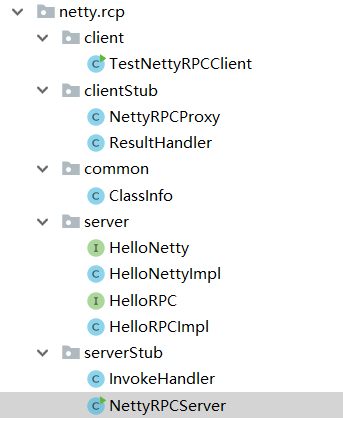Netty+Proxy实现RPC
Netty 是一个基于 NIO 的网络编程框架,使用 Netty 可以帮助你快速、简单的开发出一 个网络应用,相当于简化和流程化了 NIO 的开发过程。
直接上代码,项目类结果图

Maven包文件:
<dependency>
<groupId>io.netty</groupId>
<artifactId>netty-all</artifactId>
<version>4.1.15.Final</version>
</dependency>
<dependency>
<groupId>org.reflections</groupId>
<artifactId>reflections</artifactId>
<version>0.9.10</version>
</dependency>
客户端类代码:
package netty.rcp.client; import netty.rcp.clientStub.NettyRPCProxy; import netty.rcp.server.HelloNetty; import netty.rcp.server.HelloRPC; /** * */ public class TestNettyRPCClient { public static void main(String[] args) { HelloNetty helloNetty = (HelloNetty)NettyRPCProxy.create(HelloNetty.class); System.out.println(helloNetty.hello()); HelloRPC helloRPC = (HelloRPC) NettyRPCProxy.create(HelloRPC.class); System.out.println(helloRPC.hello("RPC")); } }
package netty.rcp.clientStub; import io.netty.bootstrap.Bootstrap; import io.netty.channel.ChannelFuture; import io.netty.channel.ChannelInitializer; import io.netty.channel.ChannelPipeline; import io.netty.channel.EventLoopGroup; import io.netty.channel.nio.NioEventLoopGroup; import io.netty.channel.socket.SocketChannel; import io.netty.channel.socket.nio.NioSocketChannel; import io.netty.handler.codec.serialization.ClassResolvers; import io.netty.handler.codec.serialization.ObjectDecoder; import io.netty.handler.codec.serialization.ObjectEncoder; import netty.rcp.common.ClassInfo; import java.lang.reflect.InvocationHandler; import java.lang.reflect.Method; import java.lang.reflect.Proxy; /** * */ public class NettyRPCProxy { public static Object create(Class target) { //代理方式实现执行接口调用远程 return Proxy.newProxyInstance(target.getClassLoader(), new Class[]{target}, new InvocationHandler() { @Override public Object invoke(Object proxy, Method method, Object[] args) throws Throwable { ClassInfo classInfo = new ClassInfo(); classInfo.setClassName(target.getName()); classInfo.setMethodName(method.getName()); classInfo.setObjects(args); classInfo.setTypes(method.getParameterTypes()); EventLoopGroup group = new NioEventLoopGroup(); ResultHandler resultHandler = new ResultHandler(); try { Bootstrap b = new Bootstrap(); b.group(group) .channel(NioSocketChannel.class) .handler(new ChannelInitializer<SocketChannel>() { @Override protected void initChannel(SocketChannel socketChannel) throws Exception { ChannelPipeline pipeline = socketChannel.pipeline(); pipeline.addLast("encoder", new ObjectEncoder()); pipeline.addLast("decoder", new ObjectDecoder(Integer.MAX_VALUE, ClassResolvers.cacheDisabled(null))); pipeline.addLast("handler", resultHandler); } }); ChannelFuture future = b.connect("127.0.0.1", 8090).sync(); future.channel().writeAndFlush(classInfo).sync(); future.channel().closeFuture().sync(); } finally { group.shutdownGracefully(); } return resultHandler.getResponse(); } }); } }
package netty.rcp.clientStub; import io.netty.channel.ChannelHandlerContext; import io.netty.channel.ChannelInboundHandlerAdapter; //客户端业务处理类 public class ResultHandler extends ChannelInboundHandlerAdapter { private Object response; public Object getResponse() { return response; } @Override //读取服务器端返回的数据(远程调用的结果) public void channelRead(ChannelHandlerContext ctx, Object msg) throws Exception { response = msg; ctx.close(); } }
服务端类
package netty.rcp.serverStub; import io.netty.bootstrap.ServerBootstrap; import io.netty.channel.*; import io.netty.channel.nio.NioEventLoopGroup; import io.netty.channel.socket.SocketChannel; import io.netty.channel.socket.nio.NioServerSocketChannel; import io.netty.handler.codec.serialization.ClassResolvers; import io.netty.handler.codec.serialization.ObjectDecoder; import io.netty.handler.codec.serialization.ObjectEncoder; /** * */ public class NettyRPCServer { private int port; public NettyRPCServer(int port) { this.port = port; } public void start(){ //接收连接事件,线程池 EventLoopGroup bossGroup=new NioEventLoopGroup(); //处理接收数据事件,线程池 EventLoopGroup workerGroup=new NioEventLoopGroup(); try { ServerBootstrap serverBootstrap=new ServerBootstrap(); serverBootstrap.group(bossGroup,workerGroup) //服务器端通道实现方式 .channel(NioServerSocketChannel.class) //线程队列中等待链接个数 .option(ChannelOption.SO_BACKLOG,128) //保存活动连接状态 .childOption(ChannelOption.SO_KEEPALIVE,true) //创建通道初始化对象 .childHandler(new ChannelInitializer<SocketChannel>() { @Override protected void initChannel(SocketChannel socketChannel) throws Exception { //得到流水线,事件通道 ChannelPipeline pipeline=socketChannel.pipeline(); //流水线添加编码方式 pipeline.addLast("encoder", new ObjectEncoder()); //流水线添加解码方式 pipeline.addLast("decoder", new ObjectDecoder(Integer.MAX_VALUE, ClassResolvers.cacheDisabled(null))); //添加自定义handler出来事件 pipeline.addLast(new InvokeHandler()); } }); //绑定链接 ChannelFuture为异步事件处理,影响后续业务 ChannelFuture future=serverBootstrap.bind(port).sync(); System.out.println("server is ready"); //future.channel().closeFuture()会阻塞,等待回推的close事件触发继续执行 future.channel().closeFuture().sync(); } catch (InterruptedException e) { e.printStackTrace(); } finally { //关闭连接线程组 bossGroup.shutdownGracefully(); workerGroup.shutdownGracefully(); } } public static void main(String[] args) { new NettyRPCServer(8090).start(); } }
package netty.rcp.serverStub; import io.netty.channel.ChannelHandlerContext; import io.netty.channel.ChannelInboundHandlerAdapter; import netty.rcp.common.ClassInfo; import org.reflections.Reflections; import java.lang.reflect.Method; import java.sql.SQLOutput; import java.util.Set; /** * */ public class InvokeHandler extends ChannelInboundHandlerAdapter { @Override public void channelRead(ChannelHandlerContext ctx, Object msg) throws Exception { //通过接口类名、方法名、参数查找到对应的接口的实现类,并且执行 ClassInfo classInfo = (ClassInfo) msg; Object clazz = Class.forName(getImplClassName(classInfo)).newInstance(); Method method = clazz.getClass().getMethod(classInfo.getMethodName(), classInfo.getTypes()); Object result = method.invoke(clazz, classInfo.getObjects()); //将执行结果返回 ctx.writeAndFlush(result); } private String getImplClassName(ClassInfo classInfo) throws ClassNotFoundException { String interfacePath="netty.rcp.server"; int lastIndexOf = classInfo.getClassName().lastIndexOf("."); String interfaceName = classInfo.getClassName().substring(lastIndexOf); //加载接口类 Class superClass = Class.forName(interfacePath.concat(interfaceName)); //加载包下面的所有类 Reflections reflections = new Reflections(interfacePath); //得到某接口下的所有实现类 Set<Class> ImplClassSet = reflections.getSubTypesOf(superClass); if (ImplClassSet.size()==0){ System.out.println("未找到实现类"); return null; }else if (ImplClassSet.size()>1){ System.out.println("找到多个实现类,未明确使用哪一个"); return null; }else { Class[] classes = ImplClassSet.toArray(new Class[0]); return classes[0].getName(); } } }
公共类
package netty.rcp.common; import java.io.Serializable; /** * */ public class ClassInfo implements Serializable { private static final long serialVersionUID = 1L; private String className; //类名 private String methodName;//方法名 private Class<?>[] types; //参数类型 private Object[] objects;//参数列表 public String getClassName() { return className; } public void setClassName(String className) { this.className = className; } public String getMethodName() { return methodName; } public void setMethodName(String methodName) { this.methodName = methodName; } public Class<?>[] getTypes() { return types; } public void setTypes(Class<?>[] types) { this.types = types; } public Object[] getObjects() { return objects; } public void setObjects(Object[] objects) { this.objects = objects; } }
package netty.rcp.server; public interface HelloNetty { String hello(); }
package netty.rcp.server; public class HelloNettyImpl implements HelloNetty { @Override public String hello() { return "hello,netty"; } }
package netty.rcp.server; public interface HelloRPC { String hello(String name); }
package netty.rcp.server; public class HelloRPCImpl implements HelloRPC { @Override public String hello(String name) { return "hello," + name; } }




